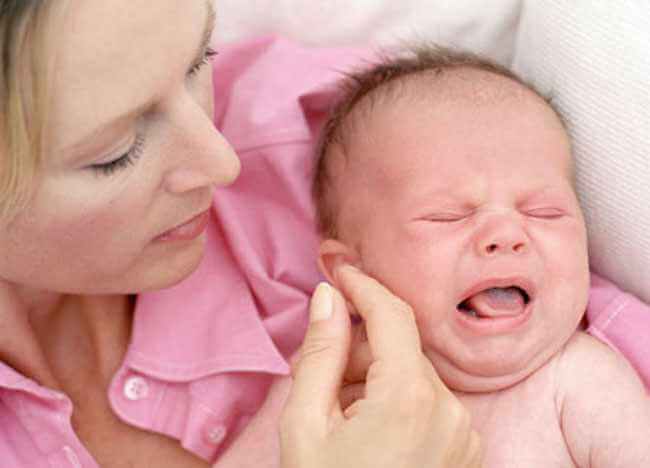Reasons Why Babies Cry


Written and verified by the psychologist María Alejandra Castro Arbeláez
When their children and babies cry, many parents feel disoriented because they don’t know exactly why their little one is upset. What’s worse, they don’t know how to take care of him to calm his crying. But in order to calm a child or crying baby, you must first make an effort to understand what is happening to him, and then find the best solutions.
Empathy is the basis for understanding crying
Parents need to be empathetic so they can understand why their child is crying, no matter how old they are. Empathy should always be used in child-rearing. It should be a common form of communication in order for children to feel supported and understood at all times. Let them know that their emotions are important, whatever they may be.
When we refer to babies, parents think that empathy is not necessary, but it is more than ever. There are parents who do not understand how a baby can cry when left alone in a crib when it seemed like he was quiet in their arms.
Of course, in his parent’s arms he feels protected and emotionally secure, and leaving him in a crib makes him feel abandoned because he will not know where you are and whether you are gone forever.
Your baby is better near you
When you are away from him, your baby doesn’t know that you will return. He thinks he is alone in the world, and who will meet his needs if you are not close? If you disappear from sight and do not feel close, it is as if you stepped onto another planet.
Can you imagine feeling like a someone very important to you ceased to exist? That’s how your baby feels when you disappear (even if you are in the next room).

If your baby is entertained by a toy or other stimulus, he may momentarily forget that you have disappeared, but when he realizes his feeling of loneliness, he will begin to cry. This is the main reason why babies cry when their mothers or primary caregivers are not around them.
Being a mom is measured not by what you leave behind when you have a baby, but by what you gain in the process.
-Anonymous-
They need you nearby in order to rest, even at night. If you want to sleep quietly, it is better to have him near you, next to your bed or in a bassinet attached to your bed… because if you put him away from you, you and your baby with both get terrible sleep.
Your baby needs your scent, to feel close and to see you to know that you are there… He needs you to calm the anguish of loneliness that torments him when you are not around.
If he sees you, he’ll feel better
Have a nightlight on so that your baby can open his eyes and see that he is by your side. It will make him feel much more relaxed and therefore fall asleep better. He will even be able to go back to sleep alone without being physically calm, because seeing you and knowing that you are by his side is more than enough to make him feel safe and have good emotional comfort.
He may need to feel your breath, smell your body and feel close to you. Skin to skin is ideal. If you put him in a crib too far from your bed, it will be a problem for him. He will not feel you and therefore will feel insecure and begin to cry. Even if you are only a few inches away, for your baby it’s like you’re in another country… he needs you in order to feel calm.
You will notice how quickly he calms down if you put him in bed with you or hold him. He will almost instantly calm because he will smell you easily and hear your heartbeat. Your presence will help him to have emotional well-being.

If you do not have him in your bed but you have his crib next to you and you touch his hand, it is enough to make him feel you and know you are by his side all the time.
You know that if you leave the room you will return later, and you know that you would not neglect your baby for anything in the world. But your little one does not know that. He thinks that if you leave, you disappear.
If he stops smelling you for feeling close to you, he will believe that you do not exist. It is easy to avoid all that emotional pain by being near your baby as long as necessary. It goes quickly and is worth it.
All cited sources were thoroughly reviewed by our team to ensure their quality, reliability, currency, and validity. The bibliography of this article was considered reliable and of academic or scientific accuracy.
- de Cock, E. S., Henrichs, J., Rijk, C. H., & van Bakel, H. J. (2015). Baby please stop crying: An experimental approach to infant crying, affect, and expected parenting self-efficacy. Journal of Reproductive and Infant Psychology, 33(4), 414-425. https://www.tandfonline.com/doi/abs/10.1080/02646838.2015.1024212
- Long, T., & Johnson, M. (2001). Living and coping with excessive infantile crying. Journal of advanced nursing, 34(2), 155-162. https://onlinelibrary.wiley.com/doi/abs/10.1046/j.1365-2648.2001.01740.x
- Jones, S. (1992). Crying baby, sleepless nights. Houghton Mifflin Harcourt.
- Illingworth, R. S. (1955). Crying in infants and children. British medical journal, 1(4905), 75. https://www.ncbi.nlm.nih.gov/pmc/articles/PMC2060770/
- Hiscock, H., & Jordan, B. (2004). 1. Problem crying in infancy. Medical journal of Australia, 181(9), 507-512. https://onlinelibrary.wiley.com/doi/abs/10.5694/j.1326-5377.2004.tb06414.x
This text is provided for informational purposes only and does not replace consultation with a professional. If in doubt, consult your specialist.
